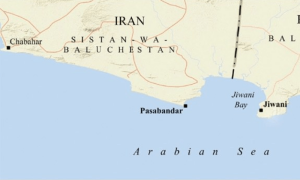The world airlines market is absolutely out of the 9/11 syndrome. The passenger number is growing very rapidly worldwide, and the air-travel is now again considered as a "safe means" of travelling.
This has triggered an enormous feeling of the fact that a large gap exist in the aviation market for new airlines. Aviation in Pakistan, however, is somewhat constrained by artificial barriers imposed by the government. In the past, many airlines came into being, in both government and private sectors, but vanished with no trace after defaulting.
The Pakistan Civil Aviation Authority (CAA) is, thus, afraid to open its sky to 'any' airline and is, therefore, lagging well behind from the rest of the world. Realizing the present market need, the Pakistani aviation industry is also gearing up to meet future demands. New airlines are coming into the market and very soon a few new carriers shall be seen by the Pakistanis.
The Air Blue, the Pearl Air, the Royal Air and the Safe Air are a few which are planning to start their operations. Three airlines are already operating on domestic and international routes in Pakistan.
These are: the PIA, the flag carrier of Pakistan; the Shaheen Air, an airlines owned by the Shaheen Foundation of the PAF; and a private airline, the Aero Asia, owned by the Tabani Group.
The PIA is the oldest, and the biggest government-owned airline. It was considered as one of the best airlines of the world in the 50s and 60s but then it lost its position. But now the airline has again started to regain the trust of the passengers and is doing better than ever before.
The acquisition of new Boeing 777-200 has enhanced its long-haul capabilities and the airline is getting ready for the challenges of the future. The Shaheen Air started its operation with great expectations in 1993 but it could not prove equal to the task.
It was very unfortunate that it had to close its operations a number of times due to various reasons. The red portion of its accounts books kept growing and many a times it was decided to close this airline. Partnership with different persons also could not satisfy the needs of passengers and the market.
In 2001 the airline was restructured and given a right direction. The main goal of the new management was to regain the confidence of the passengers and the market. Many legal issues were to be settled, and debt to be paid. The new CEO's persistent efforts resulted into new deals with other airlines and he successfully started clearing the red portion of the account books.
Gradually the passenger confidence was regained and it was felt that the airline is heading into the right direction. However now it is learnt that Canada-based Pakistani entrepreneurs, who were once serving in the PAF, have offered to buy this airline for Rs600 million.
Mr Khalid Sehbai and Mr Pervaiz Ali Khan, who will be the new CEO and the MD respectively if the deal goes ahead, have paid Rs30 millions on 8th April 2004 and the deal will be finalized within 45 days. Estimated liabilities of Rs1.5 billion shall also be transferred to the new management.
The Air Blue is planning to start its domestic operations this month. The CAA issued Regular Public Transport (RPT) Licence to the Air Blue in November 2003. The CEO, Mr Shahid Khaqan Abbasi, a former PIA Chairman, is determined to position the Air Blue at the quality end of the market.
It is acquiring three second hand Airbus 320 aircraft on lease-purchase basis and the finances are arranged by US-based Pakistani entrepreneurs. The Safe Air stopped its operations in 2000 when their 'air operating certificate' was revoked by the CAA.
Though its licence has been renewed by the CAA in December 2003, its previous CEO gave various dates for starting its operations. It was not a surprise for many when its management was acquired, in a dramatic take-over, by Syed Aftab Ahmed Tabassum, a Dutch national of Pakistan origin.
To arrange finances to run the airline remains a secondary priority as he has an uphill task of addressing to the inherent problems of the company, specially the liabilities of Rs170 millions. It is going to be another challenge for Syed Aftab to regain the confidence of its creditors, passengers and the aviation market.
Aircraft ownership and operating regulations need to be implemented in Pakistan. Companies cannot soar unless they have their own aircrafts. The CAA agrees with this fact but to bring an aircraft into Pakistan on ownership bases came as a nightmare for some.
The Pearl Air is the first aviation-license holder in the non-governmental sector which has, for the first time ever in the history of Pakistan, bought a large airliner.
The first out of the three Boeing 737-200 which landed at the Jinnah International Airport, Karachi, in February 2004, has still not been cleared by the custom and other government agencies.
Mr Arshad Jalil, MD, Pearl Air, who was MD of Aero Asia and Shaheen Air too, is now burdened to pay hundreds of thousands of rupees per month only as parking charges to CAA and is awaiting NOC from the government.
The Pearl Air is planning to deliver this aircraft to Shaheen Air on lease. The induction of two more aircraft shall commence soon after the governmental requirements are fulfilled.
Though the Pearl Air has a long way to go, but the highly anticipated and gradual induction of low priced, reliable, good western aircraft into Pakistani aviation market should fetch excellent results.
Pakistan's aviation market also has tremendous potential for cargo business. This fact was realized by many experts in Pakistan, but Capt Faizi ofthe Royal Air was the only person who got real opportunity to respond to this demand. The Royal Air has lot of success stories, with small but thriving force in the correct direction.
The aviation industry has high hopes from the Royal Air as it is slowly, but steadily advancing into the aviation market. Royal Air has obtained its RPT licence too but does not have any plans to start passenger RPT operations soon.
With the increase of awareness among the passengers, it is very important that 'quality airlines' must come up. Pakistani passengers have seen many cheap airlines with their cheap service where they save some money, but lose a lot on every flight.
Cheap food, dirty noisy eastern aircraft, overbooking, late departures and humiliating behaviour by the airlines staff are the hallmark of these airlines. Some airlines did not have any real assets and were nicknamed as 'Brief Case Airlines'.
Their aircraft were on lease, and almost every other thing was either out-sourced or was on contract. These airlines only accumulated millions of rupees as liabilities. Many have vanished, others will, if correct steps are not taken by the government.
For all its carefully positioned arguments and call for improvement, the one area government had continued to ignore was the issue of having regulations of owning aircraft by the airlines.
The public docket containing comments from all over the aviation experts in Pakistan is a testimony to the stern challenge faced by Pakistan CAA in creating credible regulations.
It seems that the CAA is responding to its commitment and that's why some new airlines have registered their own aircraft. It will definitely improve the standards of safety and service and we will see "quality airlines". Very soon, we will say good bye to the "brief case" airlines.













































